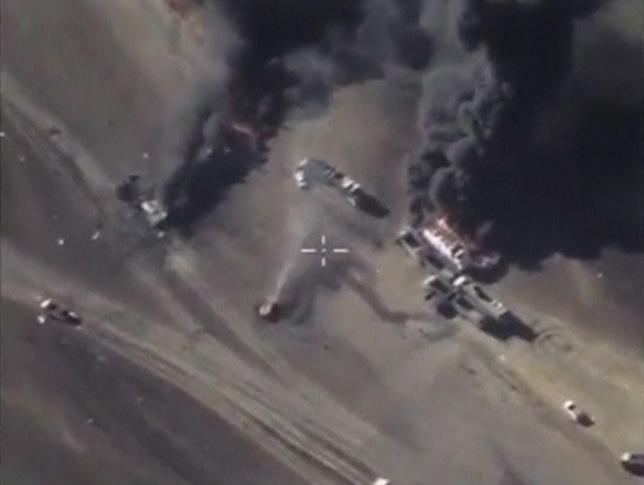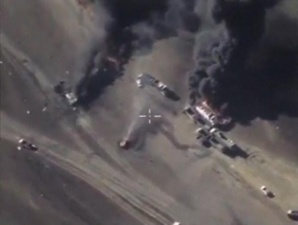Russia’s blistering attacks on the forces opposing Syrian President Bashar al-Assad has taken a toll on the rebels, thus strengthening the hands of a defiant president.
Syria is a country ravaged by war: its eastern and central parts are being hounded by the thugs of the Islamic State while insurgents are abound on the west. Russia’s bombardments have mainly targeted the insurgents on the west, although it did routinely attack military positions of the Islamic State, who are reeling from the combined attack of allied air-forces and have been forced to cut the pay of its army of goons.
On the west, in areas of great importance to Assad, rebel groups have reported intensified air strikes in preparation for ground assaults. Last week, Assad’s forces had made significant gains since the start of the Russian campaign, which resulted in the capture of the town of Salma in Latakia province.
Although the recent gains have not been the tipping point of the conflict, with rebels holding if not regaining some of their lost grounds, rebels have reported a higher than normal levels of attrition in the war front.
Officials close to government forces have said that sealing the north-western border with Turkey is a high priority since
Officials close to Damascus say sealing the north-western border with Turkey is a priority since the Turkey is backing the rebels and is feeding its supply lines. But these are coming under increased pressure with Russian and Syrian air strikes.
"Most opposition-held areas turned to defense because of the huge mobilization by Russians troops and the use of a large number of planes with unlimited munitions," said Jamil al-Saleh, a commander of a rebel group calling itself the Free Syrian Army (FSA).
Bravely playing down the gains made by government forces, Saleh said the military aids from his foreign backers, which includes, Saudi Arabia and Turkey were insufficient to confront the growing offensive by Syria and Russia, which is also backed on the ground by Iran.
"These are among the difficulties facing the FSA on the ground especially since the aerial bombing is affecting some headquarters, equipment, cars and personnel and the aid given is little compared to the ferocious attack," said Saleh.
Saudi Arabis support has yet to translate into any meanginful supply of heavy weaponry, notably anti-aircraft missiles, an insistent demand from the rebels.
A military source speaking on the condition of anonymity said, the rebels had a major setback as their weapon depots were destroyed due to aerial bombing made possible by good intelligence. Their appeal for support only goes to show the fact they had "lost a lot of field capacities", said the source.
As per Noah Bonsey, a senior analyst with the International Crisis Group, attrition levels were high on both sides.
"But it seems to be the rebel side that is more concerned about the trajectory at this moment, while the regime camp enjoys momentum. The regime itself never showed much openness for compromise even in its most vulnerable moments, so we can expect its current sense of momentum to further reinforce maximalism as Damascus pushes for a decisive military upper hand," said Bonsey.
Assad is fighting not only the rebels, but the Islamic State as well. However for its fight against the Islamic State, it is getting some major support from the U.S. led coalition who are pounding the bunch of thugs from the sky, with Kurdish forces following that up on the ground. Government forces have advanced to within a few kilometres of the al-Bab, a town being held by the Islamic State in the province of Aleppo.
For all their bravado, the Islamic State has had to eat dirt: it has faced major setbacks in Iraq and the glut in the oil market has acted as a pressure point on their finances. The flow of foreign recruits too have been chocked by tighter controls at the Turkish Syrian front, once a major transit route.
As per the Syrian Observatory for Human Rights, of the 3,000 killed by Russian air strikes, more than 900 can be attributed to the Islamic State.
Despite these losses the group is batting to safeguard its “caliphate”. It has dealt with its losses by cutting the pay of its fighters and by opening newer fronts. Its thugs have reportedly slaughtered thousands of government loyalists on the eastern city of Deir al-Zor city this week, which is one of Assad's few remaining outposts on the eastern front.
Syria is a country ravaged by war: its eastern and central parts are being hounded by the thugs of the Islamic State while insurgents are abound on the west. Russia’s bombardments have mainly targeted the insurgents on the west, although it did routinely attack military positions of the Islamic State, who are reeling from the combined attack of allied air-forces and have been forced to cut the pay of its army of goons.
On the west, in areas of great importance to Assad, rebel groups have reported intensified air strikes in preparation for ground assaults. Last week, Assad’s forces had made significant gains since the start of the Russian campaign, which resulted in the capture of the town of Salma in Latakia province.
Although the recent gains have not been the tipping point of the conflict, with rebels holding if not regaining some of their lost grounds, rebels have reported a higher than normal levels of attrition in the war front.
Officials close to government forces have said that sealing the north-western border with Turkey is a high priority since
Officials close to Damascus say sealing the north-western border with Turkey is a priority since the Turkey is backing the rebels and is feeding its supply lines. But these are coming under increased pressure with Russian and Syrian air strikes.
"Most opposition-held areas turned to defense because of the huge mobilization by Russians troops and the use of a large number of planes with unlimited munitions," said Jamil al-Saleh, a commander of a rebel group calling itself the Free Syrian Army (FSA).
Bravely playing down the gains made by government forces, Saleh said the military aids from his foreign backers, which includes, Saudi Arabia and Turkey were insufficient to confront the growing offensive by Syria and Russia, which is also backed on the ground by Iran.
"These are among the difficulties facing the FSA on the ground especially since the aerial bombing is affecting some headquarters, equipment, cars and personnel and the aid given is little compared to the ferocious attack," said Saleh.
Saudi Arabis support has yet to translate into any meanginful supply of heavy weaponry, notably anti-aircraft missiles, an insistent demand from the rebels.
A military source speaking on the condition of anonymity said, the rebels had a major setback as their weapon depots were destroyed due to aerial bombing made possible by good intelligence. Their appeal for support only goes to show the fact they had "lost a lot of field capacities", said the source.
As per Noah Bonsey, a senior analyst with the International Crisis Group, attrition levels were high on both sides.
"But it seems to be the rebel side that is more concerned about the trajectory at this moment, while the regime camp enjoys momentum. The regime itself never showed much openness for compromise even in its most vulnerable moments, so we can expect its current sense of momentum to further reinforce maximalism as Damascus pushes for a decisive military upper hand," said Bonsey.
Assad is fighting not only the rebels, but the Islamic State as well. However for its fight against the Islamic State, it is getting some major support from the U.S. led coalition who are pounding the bunch of thugs from the sky, with Kurdish forces following that up on the ground. Government forces have advanced to within a few kilometres of the al-Bab, a town being held by the Islamic State in the province of Aleppo.
For all their bravado, the Islamic State has had to eat dirt: it has faced major setbacks in Iraq and the glut in the oil market has acted as a pressure point on their finances. The flow of foreign recruits too have been chocked by tighter controls at the Turkish Syrian front, once a major transit route.
As per the Syrian Observatory for Human Rights, of the 3,000 killed by Russian air strikes, more than 900 can be attributed to the Islamic State.
Despite these losses the group is batting to safeguard its “caliphate”. It has dealt with its losses by cutting the pay of its fighters and by opening newer fronts. Its thugs have reportedly slaughtered thousands of government loyalists on the eastern city of Deir al-Zor city this week, which is one of Assad's few remaining outposts on the eastern front.






